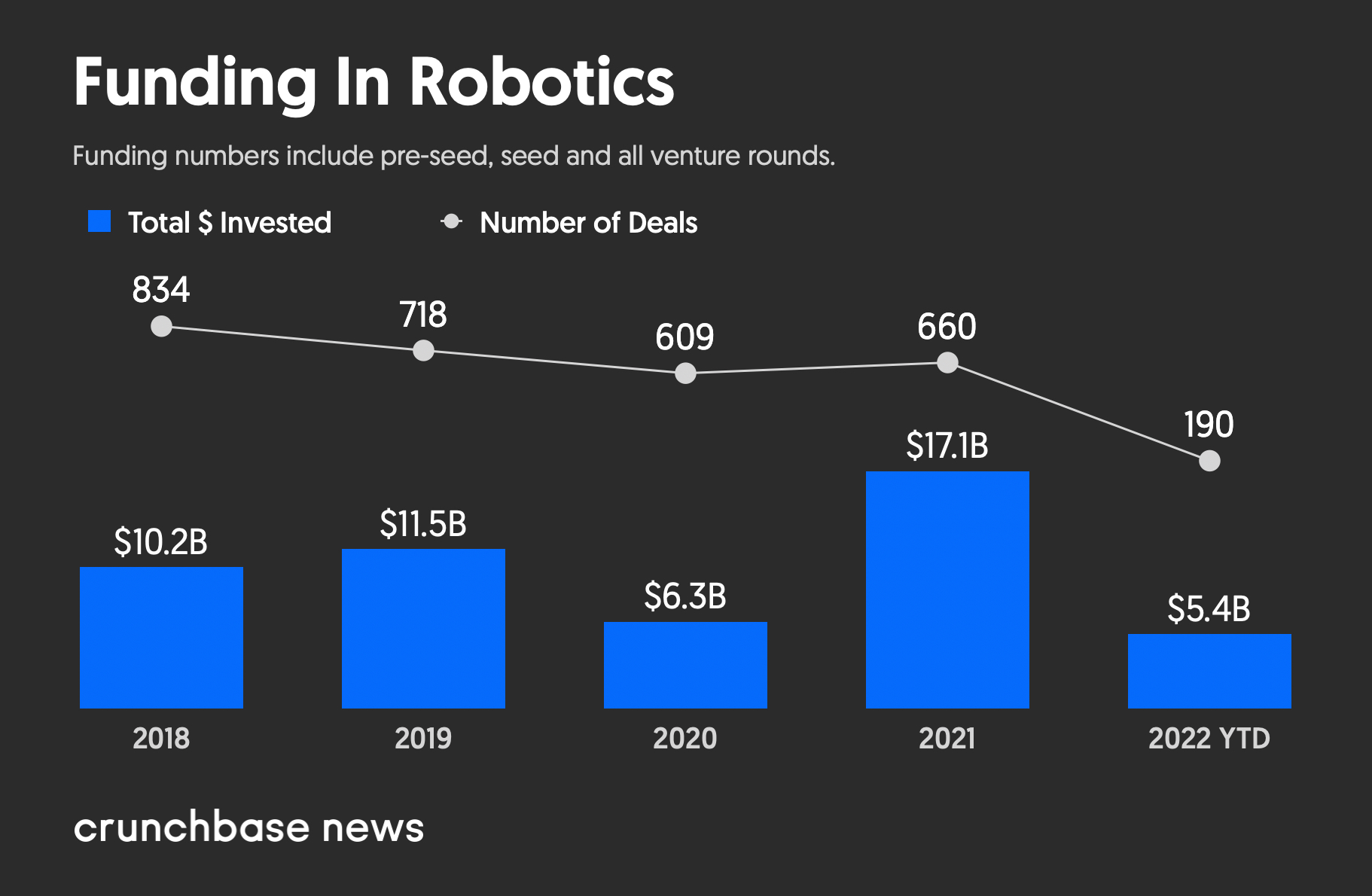The robots are coming.
Well, at least investment dollars to robotics are coming.
Once considered pie-in-the-sky deep tech that was always years away, robots are seemingly everywhere from warehouses to hospitals to construction sites, and the market to invest in robotics remains hot.
Search less. Close more.
Grow your revenue with all-in-one prospecting solutions powered by the leader in private-company data.
Last year more than $17 billion poured into VC-backed robotic startups, nearly triple the investment in 2020. This year is a little behind that pace, but the sector already has seen more than $5 billion flow to startups.

Some of the biggest rounds this year include:
- San Francisco-based autonomous vehicle maker Cruise closed a $1.35 billion corporate round in March from General Motors.
- France-based mobile robot developer Exotec raised a nearly $306 million Series D.
- Austin, Texas-based Icon, a construction technology company, closed a nearly $185 million Series B in February.
“The number of firms looking at robotics has certainly increased,” said Rohit Sharma, partner at True Ventures, who has been investing in robotic companies for years. “It’s no longer just specialist firms.”
A good illustration that the sector has moved well past just deep-tech investors is Amazon’s announcement in April it was creating a new $1 billion Amazon Industrial Innovation Fund to invest in companies working in the customer fulfillment, logistics and supply chain sectors. Three of its initial investments from the new fund have gone to startups working on warehouse robotics including Albany, Oregon-based Agility Robotics, Israel-based BionicHive and San Francisco-based Mantis Robotics.
Tech, comfort and COVID
Robotics’ move into mainstream investment portfolios is due to a combination of factors. Perhaps the most important is that technology has seemingly finally caught up with the promise.
“The technology is better. … you have components now that didn’t even exist two years ago,” said Noah Ready-Campbell. He is the founder and CEO of San Francisco-based Built Robotics—which raised a $64 million Series C in April led by Tiger Global.
Improvements in technology such as sensing, LIDAR and increased power has made Built’s platform, which transforms excavators into fully autonomous trenching robots, a reality. Not only has that technology improved, it also has become cheaper, helping companies more fully embrace the idea of robotics, he added.
Another contributing factor is comfort. Whereas once working side by side with a robot may have seemed weird, society has warmed up to the thought as robots have become more a part of everyday life.
“No doubt people are just becoming more comfortable with it,” Sharma said. “I think the advent of the autonomous car has helped with that.”
Sharma said COVID likely had an impact. He is an investor in Diligent Robotics, which develops robots to be used in hospitals and health care. The Austin-based company raised more than $30 million in a Tiger Global-led Series B last month. The COVID pandemic helped illustrate the need for such tech when nurses were overworked and workers were expected to stay separated.
“I think COVID definitely had an effect,” he said.
Not a replacement
Robotic startups are not out to replace humans in the workplace, the industry is quick to point out. Diligent Robotics co-founder and CEO Andrea Thomaz said the robots developed by her company take some of the more mundane tasks away from nurses and other health workers so they can concentrate on more important duties.
In essence, the robots complement rather than replace.
“You want employees doing what they should be doing,” she said. “What they were really hired to do.”
Thomaz, who has been studying and developing technologies for robotics for more than two decades, said she is not that surprised about the current investor interest in the space. Everyone is evaluating new ways to work.
“Investors have a thesis around the future of work,” she said. “Robotics is a pretty obvious and interesting piece of that.”
More to explore
Sharma said there is still much more to explore in the space that excites him as an investor. While the hardware part of robotics is currently being solved, he sees the software aspect as the next investment attraction.
“We will see a second wave, a software side,” he said. “I’m very excited about that.”
The software layer could help manage and train robots so their duties can continuously expand and make more of an impact for the workforce.
“It’s going to be less about hardware and batteries and more about learning and training,” he added.
The robotics space has already seen some deal-making—such as last year’s acquisition of startup Bear Flag Robotics for $250 million by John Deere—and Sharma expects more to come.
However, he also sees the space creating more large standalone companies.
“Other incumbents in certain industries will certainly come in and make deals,” he said. “But 1 in 10 (robotics companies) may also go public.”
Illustration: Dom Guzman

Stay up to date with recent funding rounds, acquisitions, and more with the Crunchbase Daily.





![Computer generating AI data. [Dom Guzman]](https://news.crunchbase.com/wp-content/uploads/AI-generated-470x352.jpg)
![Illustration of a man sitting on a huge pile o' money. [Dom Guzman]](https://news.crunchbase.com/wp-content/uploads/Giant_Funding-470x352.jpg)
![Illustration of a guy watering plants with a blocked hose - Global [Dom Guzman]](https://news.crunchbase.com/wp-content/uploads/quarterly-global-3-300x168.jpg)
67.1K Followers